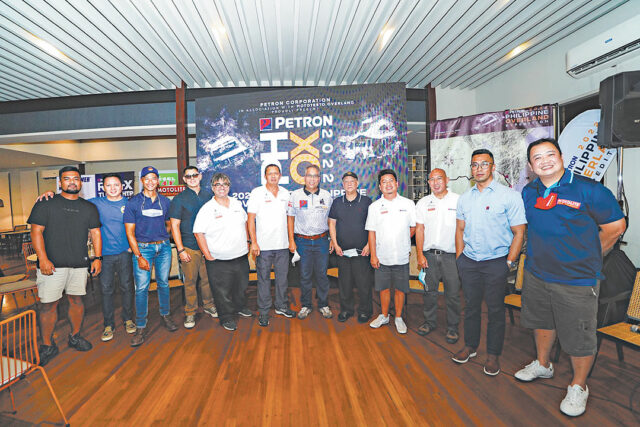PARIS — Hermes swept through a tree lined runway for its menswear presentation Saturday, sending out models in polo shirts emblazoned with seahorse designs, shimmery windbreakers in vivid colors and hefty travel bags for a summer escape.
Held in the open-air grounds of the Gobelins tapestries workshops in central Paris, the show opened with a sweater featuring a vibrant sunset. It was paired with dark shorts and sandals in neoprene, a teasing nod at the Parisian sky threatening rain. (See the show here: https://www.youtube.com/watch?v=jwpspO5b6tw)
A succession of minimalist pants and shorts followed, along with jackets in technical canvas in lilac, pink and orange, zippered straight blousons and high-neck sweaters in cashmere.
Models casually carried the label’s Haut a courroies bags, the ancestor of the iconic Kelly and Birkin handbags, which seemed to sprout at the end of their arms.
Originally designed in the early 20th century to carry horse saddles and riding boots, the trademark bag took a more contemporary turn with a distorted check pattern.
Veronique Nichanian, at the helm of men’s line since 1988 — an eternity in the ever-changing world of fashion — sought to convey a “feeling of lightness that makes you float in the sunshine,” as described in the show notes.
OFFICINE GENERALE
Contemporary French label Officine Generale took to a grand, column-lined courtyard in the historic Marais district of Paris for its latest collection of classic tailored designs for men and women, sending crisp poplin shirts and relaxed, pleated trousers with matching blazers down a cobblestone runway. (See the show here: https://www.youtube.com/watch?v=OW3Gjs2H1Xs).
Models marched in a straight line as a breeze tugged at the looser styles, blowing the tails of silk scarves into the air and adding drama to the evening show.
“I think when you put on a pair of white jeans with a black sweater and pair of sandals, you might perhaps be closer to the French dream than some of the extravagance we see,” designer Pierre Maheo told Reuters, describing his approach to fashion. “You can’t just have things that are all over the place on the podium.”
Founded by Mr. Maheo a decade ago, the label has been quietly building up a loyal following and has recently joined a wave of French brands opening stores in the United States, including Ami, which held a show at the foot of the Sacre-Coeur Basilica earlier this week.
Officine Generale is one of the regulars on the Paris Fashion Week calendar known for more intimate crowds.
DIOR
Dior transported its audience to a seaside garden between Normandy and Sussex on Friday for its latest menswear collection, aristo-chic with a utilitarian flair. (See the show here: Dior Men Spring-Summer 2023 Runway Show at Paris Fashion Week #PFW #SS23).
A-lister celebrities including supermodel Naomi Campbell, Hollywood couple Justin Timberlake and Jessica Biel, ex-soccer star David Beckham, and rival designers Olivier Rousteing of Balmain and Matthew Williams from Givenchy, sat on real grass, along with the rest of the guests, surrounded by wildflowers.
Dior menswear artistic director Kim Jones set up the runway in a makeshift space in central Paris for the show during Men’s Fashion Week. The catwalk was transformed into a lawn of purple, orange, and pink flowers, with a blue-sky painted panorama and a life-size reproduction of Christian Dior’s pink house in Normandy.
It was faced by a reproduction of a country house once frequented by the Bloomsbury Group, a British collective of writers, intellectuals and artists in the early 20th century that are often cited by Mr. Jones as an influence.
The first model kicked off the show in a monochromatic look that married a beige suit with very sporty backpack — illustrating Mr. Jones’ style of blending sharp tailoring with streetwear.
Others followed in pale blue destructured gardening clothes, as well as double-breasted jackets paired with pleated Bermuda shorts or wide-leg pants.
The artwork of Bloomsbury painter Duncan Grant was reproduced on knitted sweaters and technical fabrics.
More for style than sun protection, some models paraded with cannage hats, an openwork grid pattern favored by Christian Dior that was also found on padded long coats in blue and khaki green.
MARINE SERRE
French label Marine Serre sent athletes and artists to stroll a track field runway on Saturday evening, showcasing a sport-inspired wardrobe infused with artistic references in an all-ages, open-to-the-public fashion show. (Watch the show here: Marine Serre | Spring Summer 2023 | Full Show ).
Like Olympic opening ceremonies, delegations succeeded one another.
First up was a squad of male and female models in recycled fiber swimwear that melded to the body, framing the curves. Then came a collection of upcycled denim silhouettes with crisp patchwork. Adding color, was a series in pink, including a Chanel-like twinset — but made with towel material.
Lourdes Leon, 25, Madonna’s oldest child, sashayed down the athletic field in a crescent-moon print catsuit, piled with gilded jewelery.
Ex-Liverpool striker Djibril Cissé, 40, soccer ball in hand, wore a floral shirt and short set, while French actor Joey Starr, 54, strutted along in leather pants paired with a jewel print zip-up jacket.
In addition to the usual fashion-industry guests — clients, journalists and influencers — 900 tickets were handed out online, reservations granted on a first-come, first-serve basis. Tickets sold out in seconds.
“It is crucially important for Marine Serre to be truly inclusive, guaranteeing that our designs and experiences are accessible to all,” the label said in show notes handed to the media.
“What a crazy opportunity — a beautiful gift — she has offered us,” said plastic arts student, Carolina Bourassi, 20. “It would be nice if other brands did the same. It is not like on YouTube or Instagram,” she added.
Following the show, guests were offered drinks to celebrate the label’s sixth anniversary and take part in an open-air party.
One of the industry’s young, rising stars, Ms. Serre, 30, has won a number of fashion prizes, including the LVMH prize, handed to her by Rihanna in 2017.
LOUIS VUITTON
Louis Vuitton cranked up the volume at Paris Fashion Week Thursday, spiriting Florida’s famous Marching 100 band into the heart of the Louvre to kick off a show for its latest lineup of colorful menswear styles — in honor of the label’s popular, late designer Virgil Abloh. (See the show here: https://eu.louisvuitton.com/eng-e1/magazine/articles/men-spring-summer-2023-show-paris# ).
“Virgil, long live Virgil,” rapper Kendrick Lamar intoned, seated next to model Naomi Campbell on a bright yellow runway — a blown-up toy racetrack that wound around a cobblestoned courtyard with a fountain running in the center.
Performers from the Florida A&M University band twirled flags to the fanfare of the brass instruments, breaking out into dance moves before marching off the runway in formation, clearing the way for the models.
For the spring-summer collection, the fashion house’s men’s studio drew on Abloh’s signature tailoring, sending out elongated suits in pastels, jackets covered with wildflower prints or embellishments like paper airplane shapes and dangling patches in the form of scissors. There were twisted, psychedelic biker jackets, fringed jean jackets, knit hats and shirts with jagged edges worn with loose, Bermuda shorts.
At the end of the show, models carried out a lightweight strip of pastel rainbow fabric, recalling Abloh’s first Paris show for the label in 2018 which he held on a rainbow runway, symbolizing his approach to diversity.
Abloh, fashion’s highest-profile Black designer, died last year at age 41 after a battle with cancer. He was known for taking inspiration from the streets and credited with cementing the arrival of streetwear into the world of high-end fashion.
AMI
Micro shorts, thigh-high boots, marinières and oversized coats took to the runway at Ami women’s and men’s fashion show on Thursday at the foot of Sacré-Coeur Basilica, as the French label sought inspiration in classic Parisian chic with a daring twist. (Watch the show here: https://www.amiparis.com/ph/ ).
Audrey Tautou, star of Amelie, opened the spring-summer show in the perfect attire of the Parisian woman: a timeless cream trench coat, a simple shirt and white pants.
Designer Alexandre Mattiussi put blazers atop not totally unbuttoned shirts and added a bubble-gum-pink coat to a simple pair of beige pants.
For the more festive look, one model shimmered in black sequin pants with matching bikini top while another paraded in a see-through A-line dress.
Skirts were mini, pleated or done in blue Vichy pattern, and slung low.
In pairing sneakers, joggers and leather jackets, Ami stuck to its relaxed approach to fashion.
One of the highlights of Ami’s show was the final outfit, worn by 1990s supermodel Kristen McMenamy in a totally red look. — Reuters





























